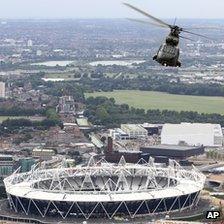Armed forces on Olympics standby
- Published

The armed forces were due to provide some 13,500 servicemen and women
The UK's armed forces are on standby to provide an additional 3,500 troops to help with security at the 2012 London Olympics, the Βι¶ΉΤΌΕΔ has learned.
It comes amid fears that private contractor G4S would not be able to provide enough trained staff in time.
The armed forces are already providing some 13,500 personnel - this could now reach 17,000, meaning summer leave for some troops is likely to be cancelled.
G4S said it had "some issues in relation to workforce supply".
The company is being paid Β£300m to guard the Games, but the Βι¶ΉΤΌΕΔ understands it has not been able to guarantee it can supply the 10,000 guards it has been contracted to deliver.
'No impact'
A G4S spokeswoman said the company had accepted "that the government has decided to overlay additional resources".
She added: "This has been an unprecedented and very complex security recruitment, training and deployment exercise which has been carried out to a tight timescale.
"We have encountered some issues in relation to workforce supply and scheduling over the last couple of weeks, but are resolving these every day and remain committed to providing a security workforce for the start of the London 2012 Games."
The armed forces were already due to provide some 13,500 personnel to help at the Games, with more available as a contingency plan.
Whitehall sources are keen to stress that there is no impact on security at the Games.
Defence Secretary Philip Hammond will announce more details about the extra troops on Thursday, the Βι¶ΉΤΌΕΔ Office said.
In a statement, it said: "We have agreed to offer help to G4S by revising the level of military support."
It added the government and all involved were focused on delivering a "safe and secure Games".
"Our approach is intelligence-led and risk-based, and we retain the ability to be flexible in our response.
"The government is committing Β£553m for venue security and we remain confident that we will deliver within budget."
'Deeply concerned'
Keith Vaz, the Labour chairman of the Βι¶ΉΤΌΕΔ Affairs Select Committee, has said he will write to the home secretary for an explanation to find out what is happening.
He said he was "deeply concerned" that G4S were now unable to deliver their contract and that "the Βι¶ΉΤΌΕΔ Office have left contingency plans to the last moment".
Tessa Jowell: "It's a matter of concern that this failure of G4S seems to have emerged"
And Labour's shadow Olympics minister, Tessa Jowell MP, said there was "clearly a serious problem".
"With two weeks to go to the start of the Games, it is imperative that action is taken to ensure that the full and necessary quota of security personnel are in place so that the Games will be safe and secure," she said.
"We need to know why the problem has emerged so late in the day and precisely what has been agreed to.
"We also must know whether this affects army commitments elsewhere, which units are providing people and what terms and conditions are given for those who will likely lose periods of leave."
She added that - in the spirit of the cross-party approach to the Games - it was "essential that the opposition is kept fully informed of these events as they develop".
G4S said its planning with organising committee Locog and other security agencies allowed for "a variety of contingencies which have been reviewed in the build-up to the Games."
A spokesman for the London mayor, Boris Johnson, said: "The mayor takes the issue of Olympics security extremely seriously, and having the finest and bravest service men and woman in the world at our disposal during the Games should be a source of great comfort."
The government has previously said a total security force of 23,700 will take care of venue security, including the G4S contingent.
G4S will have overall control of Olympic venue security, working alongside unarmed troops, searching and checking people going into the stadiums and other venues.
Olympic sites number more than 30 sporting venues and more than 70 "non-competition venues" including car parks and hotels.
- Published30 April 2012
- Published30 April 2012
- Published11 July 2012